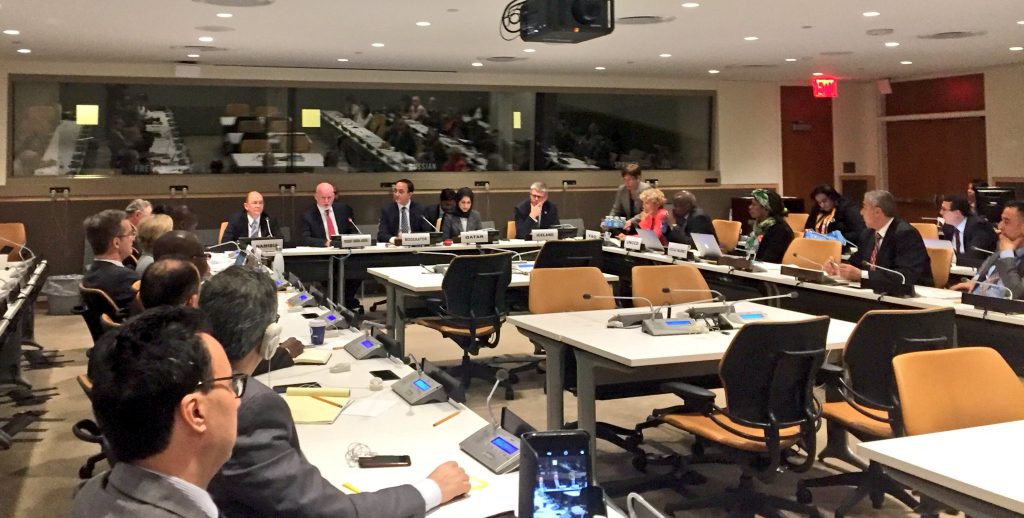As delivered
Statement of H.E. Mr. Peter Thomson, President of the 71st Session of the General Assembly, at the High-Level Event on Desertification, Land Degradation and Drought
1 May 2017
 H.E. Mr. Einar Gunnarsson, Permanent Representative of Iceland to the UN,
H.E. Mr. Einar Gunnarsson, Permanent Representative of Iceland to the UN,
H.E. Mr. Neville Gertze, Permanent Representative of Namibia to the UN,
H.E Ms. Alya Ahmed Saif Al-Thani, Permanent Representative of Qatar to the UN,
Excellencies,
Ladies and gentlemen,
It is an honour to be here today. I would like to begin by thanking the organisers of this event – Qatar, Iceland, and Namibia – for their leadership and commitment to raising global awareness of the critical issues of desertification, land degradation and drought.
Across our world, each year 12 million hectares of land are lost due to desertification and land degradation.
More than half of the world’s agricultural land is affected by soil degradation, and the deterioration of drylands has led to the desertification of 3.6 billion hectares of land.
The impact of this loss has been devastating.
The lives and livelihoods of more than one billion people are currently under threat, with soil loss, erosion, contamination, and degradation, affecting food security, health, and sustainable economic opportunities.
Indeed, the catastrophic drought and famine that is currently endangering the lives of millions of people across Africa is a stark reminder of the devastating consequences of desertification and land degradation, and of how it can undermine our ability to achieve sustainable peace and development.
Desertification and land degradation are part of the advancing environmental concerns emanating from global greenhouse gas emissions, rising global temperatures, the destruction of ecosystems, and the extreme weather events that are now characterizing climate change.
On top of climate change, desertification and land degradation are driven by human activity, particularly unsuitable land use and management, deforestation, mining, overgrazing, and pollution. These are all human-induced problems, so rest assured we can produce human-led solutions.
As the international community sets its shoulder to the wheel to drive the implementation of the 2030 Agenda on Sustainable Development, the Paris Agreement on Climate Change, and indeed the UN Convention to Combat Desertification, and the UN Strategic Plan for Forests, it is vital that we ensure desertification, land degradation and drought are embedded as integral elements of the implementation of all 17 Sustainable Development Goals.
Events such as today’s are essential steps along the way. We must use such opportunities to urge Governments to promote comprehensive, coordinated and multi-sectoral approaches to sustainable land use and management. We must call for such action to bring together agriculture, energy, environment, finance, climate change, and planning agencies in a concerted effort.
We must encourage all key stakeholders to forge new strategic partnerships, and urge them to engage women and young people as partners in protecting lands and ecosystems.
Excellencies, ladies and gentlemen
In these difficult times, we do have the ability to support and replicate successful initiatives such as the Great Green Wall for the Sahara and Sahel, whereby African States are restoring more than 50 million hectares of land.
Also, let us all be conscious that we cannot address degradation of terrestrial ecosystems without addressing their interconnection with the Ocean.
The health of coastal and marine ecosystems have a direct impact on terrestrial ecosystems, and vice versa. Only consider the fact that 80 percent of marine pollution originates from land-based sources, and we appreciate immediately that land and Ocean issues must be addressed in an integrated and inclusive way.
With this in mind, I want to emphasise that in five weeks’ time we will have the opportunity to address such issues in detail, during The Ocean Conference, to be held from 5 to 9 June here at the United Nations.
Excellencies, ladies and gentlemen
As the global population continues to grow beyond anything this planet has experienced before, ever more stress will be placed on the land as humanity seeks to secure its sources of food, shelter and economic opportunity. We must assume that the realities of planetary supply and the insatiability of human demand will be vital elements of the 21st Century’s progress.
Seen in this context, the imperative of our effectively addressing desertification, land degradation, and drought, takes on high priority in the proper management of human development. It is thus that these challenges play such a prominent part in the Sustainable Development Goals and it is thus that they must be central to our efforts to implement the 2030 Agenda for Sustainable Development. Only through the success of these efforts will we be able to secure a safe and sustainable future for all.
I thank you.

